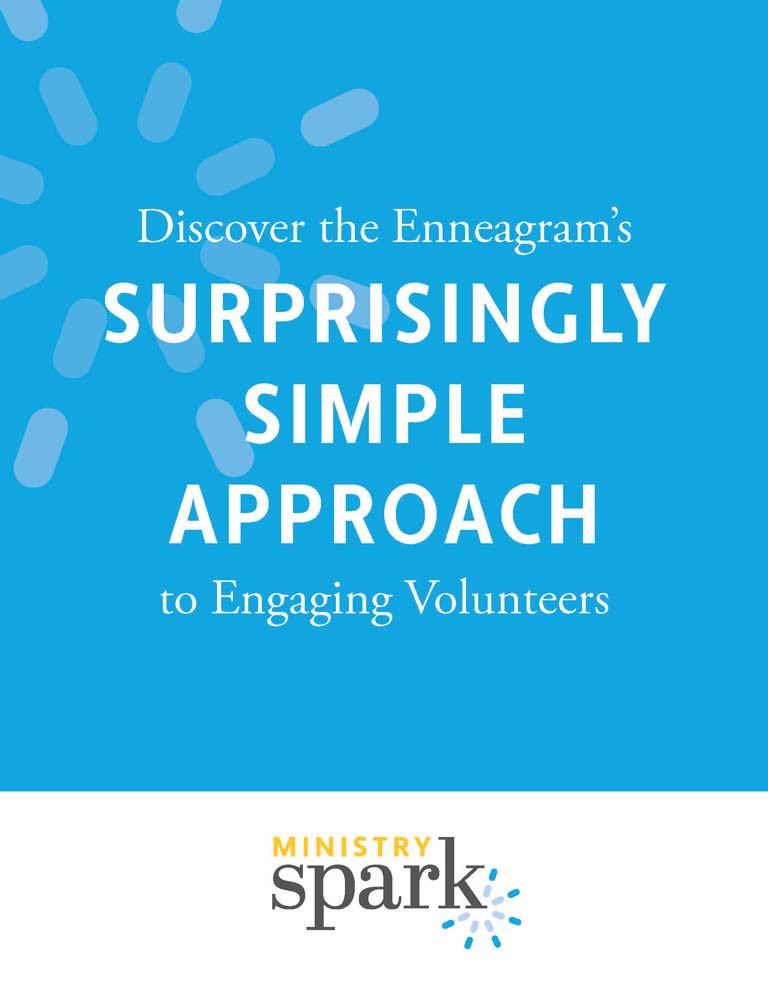< Back to The Loyalist (Enneagram Six) article.
As ministry leaders, we are not exempt from the mistake of thinking that everyone looks at life the same way we do. We assume the volunteers we lead have similar needs and are driven by the same desires.
This sometimes makes it hard for us as ministry leaders to understand the unique motivations, concerns, and styles of the staff and volunteers we serve.
On the surface, the Enneagram looks like any other personality test. It features nine distinct ways of looking at the world. But it also examines the unique ways that each type responds to living in this broken and often confusing world.
To the Seven, the whole world is a buffet—a never-ending smorgasbord of experiences and interests.
The Enneagram doesn’t just describe a person’s personality, it helps us understand what motivates him or her. It encourages us as ministry leaders to be mindful of our perspectives—and perspectives of our teams—in a way that can help us:
- Identify the strengths and challenges of the individuals on our teams
- Create harmony and operate more effectively
- Maximize everyone’s contribution
- Inspire team members with guidance that empowers and invigorates
This series of articles will improve your ability to lead and manage your staff and volunteers. If you’re unsure about your Enneagram type or want to give the test to your volunteers and staff members, you can take a free online assessment like the one at YourEnneagramCoach.com.
How to Use These Articles
This series of articles examines each of the nine Enneagram types, and includes the following elements:
- Attributes: Three adjectives that describe each type.
- Driving motivation: This section helps you understand what desires and fears drive a specific type’s behavior.
- Key verse: Each personality type has a verse with a helpful reminder to turn their attention to God.
- About the type: This is a brief overview of each type.
- Leading as your type: Each personality has unique strengths as a leader. Here we examine those strengths and offer some suggestions for overcoming the corresponding weaknesses.
- Motivating each type: For example, if you’re a Type Eight trying to understand how to motivate a Four, this section will help.
These resources will develop your skills as a leader and manager and enable you to develop a strong team.
Type 7: The Enthusiast

Attributes: Spontaneous, Versatile, Optimistic
Driving motivation: To have fun
Key verse: “Praise the Lord. Blessed are those who fear the Lord, who find great delight in his commands” (Psalm 112:1, NIV).
About Sevens:
To the Seven, the whole world is a buffet—a never-ending smorgasbord of experiences and interests. Their number-one goal in life is to avoid pain and frustration. Restless and easily bored, you can often find the Seven planning out their next adventure.
The Seven doesn’t like to be boxed in. They always want options and the ability to juggle multiple interests. They’re usually brilliant, but unlike the Five, they prefer to know a little about a lot of things instead of diving into any one thing with too much depth.
This makes them particularly adept at pulling together and harmonizing different kinds of information—often making connections that others might miss.
Sevens absorb information quickly and pick up things pretty fast. They have a lot of confidence in their ability to figure things out, and they’re natural risk-takers.
When pressed or stressed, they will retreat into fantasies that allow themselves to abandon the limitations of what they’re currently doing and explore some new options.
Leading as a Seven:
Youthful and evocative, Sevens are natural storytellers. You connect well with children, inspiring courage and enthusiasm. But that aptitude for encouraging others lends itself to leadership as well. You have a natural ability to rally others.
While your natural aptitude can cover many of your weaknesses, being able to skate by on very little preparation allows you to be scattered and undisciplined. To lead effectively, you need to be able to focus in and follow through.
Your biggest struggle is that you don’t get the same sense of satisfaction from checking tasks off your to-do list as you got putting them on there.
Motivating a Seven:

Sevens are driven by their own internal gyroscope. They don’t often need external motivation. Even when they have someone in charge of them, they often don’t even realize it.
But when it’s necessary, guiding them toward a goal is a lot more productive than pushing them. If they perceive that you’re trying to control or limit them, Sevens slip into fight-or-flight mode.
When it’s time to sit down and discuss performance issues with the Seven, start with the good news before the bad. They can be quite sensitive and take criticism very hard.
In a tense situation or altercation with a Seven, avoid the temptation to match their volume and forcefulness with your own. It’s easy to de-escalate tension with Sevens by demonstrating kindness and sensitivity.
The mundane is the Seven’s biggest enemy. They need a certain amount of joie de vivre baked into their everyday tasks. Volunteer Sevens need roles with a lot of different parts, or at least the flexibility to do the same old things in new ways.
And keep them away from responsibilities that require a lot of attention to detail and paperwork!
Building Better Teams
People operate best when they’re plugged into roles where they really fit. A lot of the ministry struggles churches experience come from filling vacancies with whoever is available.
Hopefully, the Enneagram will help you better understand your unique management style—and how you can position people according to their strengths. Because teams that fit together well can help churches thrive!
Valuing the various personalities in our churches empowers us to do better ministry. Once we understand the rich diversity of our churches we can:
- Appreciate the balance that comes from our various strengths
- Quit struggling to copy the leadership styles of others and lead from our own strengths
- Organize our teams so that everyone gets an opportunity to do great work
- Abandon a one-size-fits-all approach to encouragement and empowerment
Go to The Challenger (Enneagram Eight) article. >
Additional Articles for Leading Volunteers with the Enneagram
- How to Lead Volunteers: The Reformer (Enneagram One)
- How to Lead Volunteers: The Helper (Enneagram Two)
- How to Lead Volunteers: The Achiever (Enneagram Three)
- How to Lead Volunteers: The Individualist (Enneagram Four)
- How to Lead Volunteers: The Investigator (Enneagram Five)
- How to Lead Volunteers: The Loyalist (Enneagram Six)
- How to Lead Volunteers: The Challenger (Enneagram Eight)
- How to Lead Volunteers: The Peacemaker (Enneagram Nine)

Discover the Enneagram’s Surprisingly Simple Approach to Engaging Volunteers

Discover the Enneagram’s Surprisingly Simple Approach to Engaging Volunteers











